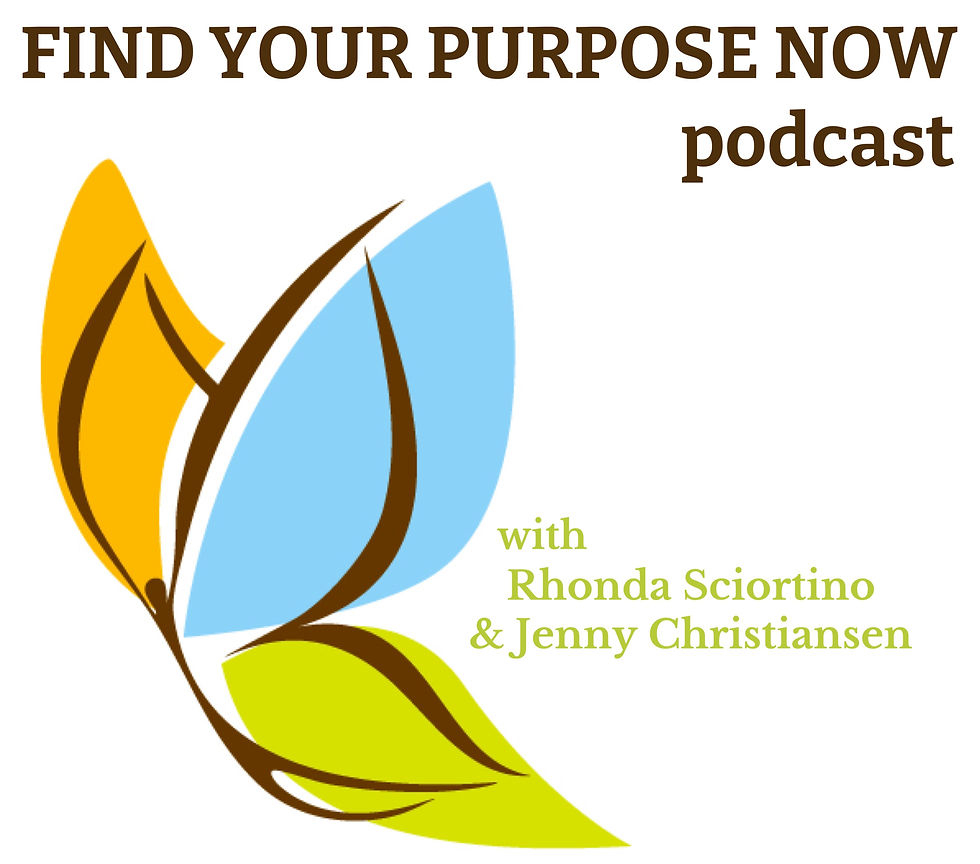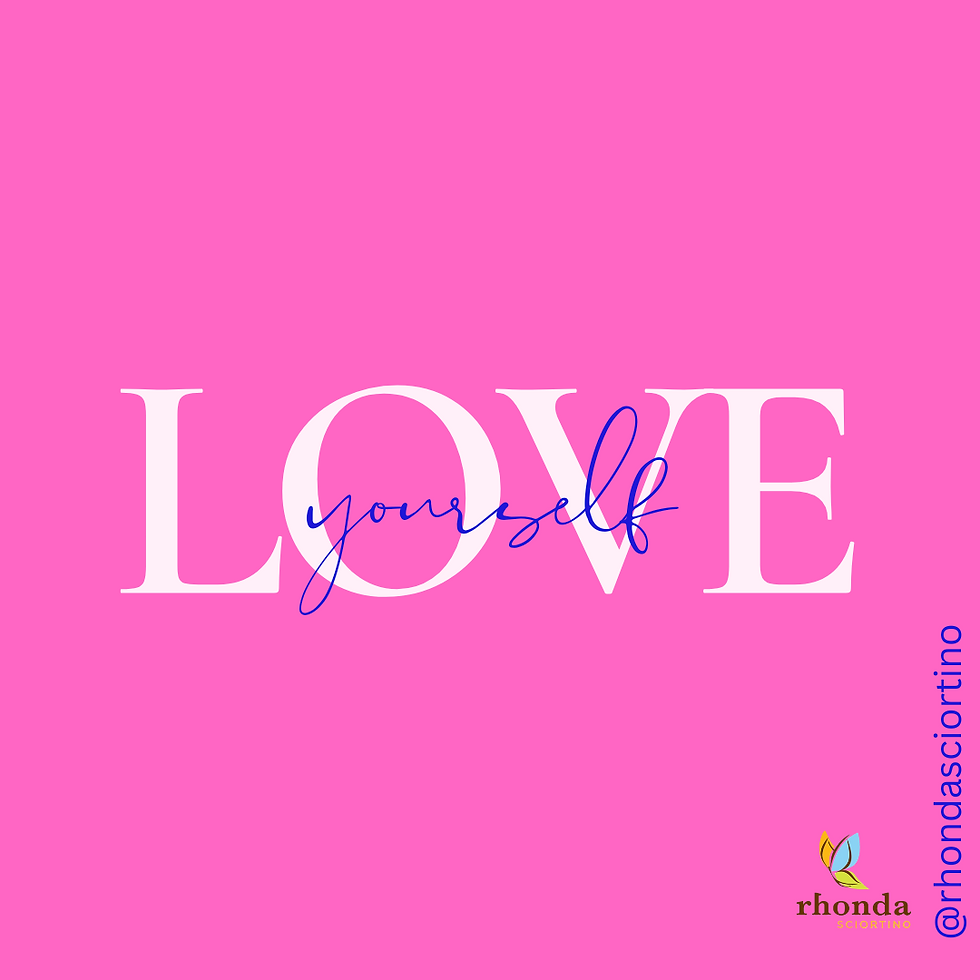31 Days To Better Relationships
- RHONDA SCIORTINO

- Nov 1, 2022
- 11 min read
Updated: Nov 17, 2022
Having healthy relationships with good people is one of the most important things in life. Simply put, bad relationships harm us, and good relationships have the capacity to heal us.

Think about it, when you have a good, healthy relationship in which you know that the other person thinks you're awesome, you feel better about yourself. On the other hand, when you have someone in your life who you think does not like or respect you, it can bring you down.
While we can't make everyone like us, we can attract good people into our lives, and we can do our part to create and grow good, healthy relationships. Having healthy relationships with good people is the first of the five facets of real success. The other facets are peace, joy, financial provision and wellness. Having at least one good relationship and a balance of all of the other necessary components are the ingredients for real success.
The good news is that there are easy, simple things that you can do to establish new relationships and improve the ones you already have. There are 31 relationship tips here—one for every day of the month. If you will do your best to implement these tips, your relationships will improve. When that happens, your life will improve.
You can do incorporate these tips into your life on your own, but consider doing this with a friend or with a group of friends, or with family, or with co-workers, or with neighbors, or with anyone who wants to have better relationships and a better life. Everything feels better when we have at least one quality relationship.
Here are your 31 healthy relationship tips!
Healthy Relationships 101.1: Don’t take loved ones for granted. When you don’t have the time to hang out or talk, give a hug, send a note, or send a quick encouraging word.
Healthy Relationships 101.2: Keep your promises. Breaking promises to the people closest to you because they’ll “understand” will eventually deteriorate even the strongest relationships.
Healthy Relationships 101.3: Intentionally set aside time to spend with those you care about. You don’t have to do anything spectacular or costly. Remember, there is no substitute for real “face time.”

Healthy Relationships 101.4: Deliberately change the channel of your mind from work or other responsibilities when you're with the people you care most about so that you will not be preoccupied or “unloading or venting” on them. In other words, when you’re with loved ones, be truly with them—body and mind.
Healthy Relationships 101.5. At the speed of life, we often miss important clues about what’s going on with those closest to us. Intentionally create an environment where you and those you care about can talk during chores or other mundane activities. For example, be in the kitchen together while preparing meals. Turn off the television and have a meal or take a walk together.
Healthy Relationships 101.6: When you greet one another, smile, make eye contact, be cheerful, and be positive. If you fail to make this effort, your words may say, “Hello” while your face says, “I’m not happy to see you.”
Healthy Relationships 101.7: When greeting your loved ones after work or school, ask what happened in their day. Ask children what they learned. It may take a few questions before they’ll open up—especially if this is new. The point here is to focus on others so that you do not walk through the door talking only about your day, completely unaware of what has happened in the lives of those you care most about.
Healthy Relationships 101.8: A totally free, very simple, yet powerful way to improve your relationships is to find something good about each person you care about and point it out to him or her. Compliment the person and tell others about a talent or trait that you admire. Stay away from vague compliments because they often sound disingenuous. Focus on personality and character traits, skills, talents, and abilities. For example, “You are such a good listener,” “you are so cheerful,” or “you are such a trustworthy person.”
Healthy Relationships 101.9: Develop camaraderie by naming “our song” or a favorite TV show or movie, game, hobby or some other activity that you and your tribe can claim as “your thing.”
Healthy Relationships 101.10: Come up with fun nicknames for loved ones. (Make sure these are never demeaning in any way.) Giving a playful pet name to loved ones tends to endear you to one another, and very importantly, it helps establish a positive identity for the other person. If you don’t tell your loved ones who they are, they may form their self-image from other influences including videos, music, or from bullies or negative people. Positive identity builders buoy self-esteem and a sense of belonging.

Healthy Relationships 101.11: Never, ever compare your loved one with anyone else. Each person is a unique individual with a combination of traits all their own. Comparing only makes the person in the “one-down” position feel badly. And when people feel badly about themselves, they may find their self-esteem from some other inappropriate person or group.
Healthy Relationships 101.12: DO NOT ASSUME that just because friends haven’t called, written, or texted you in a while that they are angry, disappointed, or don’t like you anymore. Everyone has their own life and issues. Instead of jumping to the conclusion that others don't care about you or are disrespecting you, reach out and let them know that you're thinking about them. Ask what’s going on in their lives. They may be struggling and in need of a friend.
Healthy Relationships 101.13: Do not get offended if you aren’t invited or included. It could be that the people getting together are doing so for a specific reason that is personal or has to do with someone you don’t know. It could simply be an oversight. Either way, always give the benefit of the doubt, assume the best of others, and avoid jumping to hurt feelings. Those types of feelings can lead to bitterness and resentment, which can diminish or even destroy relationships..
Healthy Relationships 101.14: Make the effort to do something kind for those closest to you. It doesn’t have to cost anything. A quick text to let them know that you’re thinking of them is a great reminder. A little note stuck in a lunchbox, a briefcase, or a shoe is a pleasant surprise and can be a fun encouragement.
Healthy Relationships 101.15: Stop expecting those around you to meet your needs. That’s way too much responsibility for any other human. No one person can ever meet that enormous expectation. Most importantly, expecting others to make you happy and keep you “fixed” gives the “remote control” for your happiness to someone else.
Healthy Relationships 101.16: When someone does take care of you or meets a need, be grateful rather than expecting it to happen continuously. Take care of yourself, and look around to see what needs of others that you can meet.
Healthy Relationships 101.17: The people closest to you are going to let you down. They are going to hurt your feelings. Don’t be shocked when it happens. Recognize that bad behavior is a poorly stated question or statement that clearly telegraphs that something is wrong with the other person. Rather than react to bad behavior with hurt or anger, ask what happened that triggered it. There are times to let people know how you feel when they do something that hurts you. And there are times to ignore it, forgive it, and move on.
Healthy Relationships 101.18: Communicate clearly what you like and don’t like about the behavior of others. Here’s an example of reinforcing positive behavior: “When you take the trash out, it makes me feel so proud of you for doing your part to keep this house clean.” Here’s an example for helping to change negative behavior: “When you yell at me, it makes me feel bad because in good relationships people don’t yell at one another.”

Healthy Relationships 101.19: Don’t rush to judgment about someone close to you despite whatever evidence there may be of wrongdoing. Always reserve judgment until you give the person an opportunity to explain. Remember that even the worst transgression is driven by something that is wrong with the person. Before ending the relationship entirely, ask yourself if the other person can be fixed, if you have the power to fix them (or stick with them while they try to fix themselves), or if you have the grace and mercy to overlook it.
Healthy Relationships 101.20: When you’ve done or said something that was wrong or hurtful to someone, say you’re sorry and mean it. Those two words may not “fix” everything, but accepting responsibility and offering a genuine apology is a good start toward restoring the relationship.
Healthy Relationships 101.21: When you are in relationship with someone who consistently hurts or uses you and who does not have your best interests at heart, remember these five options and assess when to use them -- 1) educate, 2) confront, 3) create healthy boundaries, 4) distance yourself, and 5) step away entirely.
Healthy Relationships 101.22: You have the power to bring out the best in the people around you by finding something good about them and complimenting them about this and sharing it with others. For example, “I really appreciate how you put your things out of the way of the door so that no one trips over it.” Sometimes you have to dig deep to find something to compliment; but as you do this, the people will begin to value themselves, and their behavior will line up with their improved self-image.

Healthy Relationships 101.23: Help people around you rise to a new level by helping them see that their opinions matter. For example, ask questions of those around you such as,“What would you change about our town if you were mayor?” "What do you think about current events?" To encourage young people, you can ask things like, “Can you imagine what it would be like to be a teacher?” “What do you think it would feel like to be an attorney winning a big case?” Asking good, open-ended questions stimulates good thoughts and conversation.
Healthy Relationships 101.24: Involve your loved ones in helping others. For example, call around and find three non-profit organizations that are accepting donations of gently used items or will welcome a visit. Then ask everyone in your tribe to vote for which organization to support and why. Then gather gently-used items, magazines, cookies, etc. (whatever the expressed need of the organization) and deliver them together. Include small children by asking them to give one of their toys or make a colorful drawing. In this way, everyone is engaged in the giving. When we give to others, we feel better about ourselves.
Healthy Relationships 101.25: We all feel better when we feel successful. So set your loved ones up for success. You can do this by assigning an important task to them, giving clear explanations and responsibilities, helping where needed (without taking over), and then celebrating the success. For example, assign the task of making lunch to a different family member one day of every week. Where children are involved, make the suggested lunch age-appropriate, such as making sandwiches rather than preparing something involving the stove. Events where one person is celebrated for what they’ve prepared can become a family tradition carried on for years. Traditions create a sense of belonging. We all feel better when we feel like we're a part of something bigger than ourselves.
Healthy Relationships 101.26: Encourage others with a word or a note. You can carry little blank cards or Post-it notes with you and write notes when you see an opportunity to encourage someone. An example would be: “I was having a rough day, but then I saw your beautiful smile. YOU made my day.” “I appreciate that when I ask for your opinion, you give me your honest thoughts. A real friend tells the truth—thank you.” “Thank you for your kindness.” Make a habit of encouraging others, and you’ll both be uplifted.

Healthy Relationships 101.27: When someone you care about tells you about their day or about something that is troubling them, put down the cell phone, mute or turn off the television, focus your eyes on their eyes, and deliberately and intentionally listen without interrupting. Hear them out. Simply listening without jumping to a conclusion or cutting them off will improve your relationships exponentially. If you have trouble with this, consider that the people you’re watching on TV are not your personal friends. They don’t know you or care about you. The people you’re following on social media are probably not closer to you than the person who needs your attention at that moment. Prioritize your relationships with eye contact and active listening, and you will greatly improve your life!
Healthy Relationships 101.28: Create a memory book with the children, tweens, and even teens in your life. Get out the photographs and saved school papers; add the child’s drawings and poems. Add items to the memory book with every tradition you create or event you experienced. You can also create a section for “dreams” by cutting pictures out of magazines of places you want to visit and things you want to do. If younger children are involved, spread a sheet or towel underneath to protect the table, but don’t worry about blobs of glue or other messes on the book. That will be part of the charm of it in later years. You can also do this with notes and cards from friends. When you’re down emotionally, pull out the book with all those sentiments and look at it to lift your spirits.
Healthy Relationships 101.29: When the people closest to you aren’t behaving well, rather than immediately moving to hurt and anger, consider that people let their frustrations out around those they trust and with whom they feel safest. Ask what’s going on with them and then listen. The real reason may not come out right away. It may be the last on a long list of things. Really listening and watching facial expressions and body language will go a long way toward developing rapport and trust, and may lead to better behavior in the future.

Healthy Relationships 101.30: When there are things your loved ones have asked you to do, make time to do them. Your actions show love in a way that talking never can. The tasks may seem insignificant to you, but they could mean a lot to your loved ones.
Healthy Relationships 101.31: Create activities for your tribe to do together. This could be as simple as preparing and eating a meal together or as involved as starting a business together. Imagine the feeling of satisfaction and all the life lessons that could be learned by finding a great muffin or cupcake recipe, baking, packaging, and then selling them at nearby businesses, then celebrating your successes together. If even the youngest has a job (putting a sticker on the cellophane that wraps the muffin), everyone gets the satisfaction of having accomplished something and of being a valuable part of the team.
Hopefully these tips have inspired you to value good relationships. The true measure of a person’s success is the quality of his or her relationships.
Our time here in this life is finite, and there are no guarantees of tomorrow. So be sure that the people you care about know how you feel about them. Tell them with words, show them with actions, and express your feelings in facial expressions, body language, good attitude, and with some kind of demonstration that you care about them and their thoughts, feelings, and opinions.
Beautiful relationships require an investment of time, but it's so worth it. Use some of the 1,440 minutes you get every day to thank people for what they've done for you, what they've taught you or ways they've cared about you. Don't take them or their loving actions for granted. Show gratitude every opportunity you get.
I would love to hear about how you develop the relationships that are priceless to you.
P.S. Check back for tips on developing each of the five areas of real success. And subscribe at www.rhonda.org/subscribe so you never miss out on tips, events, retreats and online courses. (Watch for the release of the new self-paced, micro-learning course, 7 Days to Healthier Relationships.)

After an abusive childhood, Rhonda Sciortino was loved into wholeness by a series of beautiful souls who invested time and love into a wounded, rough, tough survivor. Rhonda founded Successful Survivors Foundation to help other survivors of childhood trauma to go from victim to survivor and ultimately to successful survivor.
This podcast will help you find and live your purpose and enjoy the peace and joy that accompanies it. Subscribe now and share this with a friend. Find Your Purpose Now is available on Apple Podcasts, Google Podcasts, Spotify, Iheartradio, Amazon music, Overcast, Castbox, Pocket Casts, Radio Public, and right here at www.rhonda.org/podcast.
















Bigg Boss Show lets fans support their favorite contestants by casting votes online. Stay updated with Bigg Boss Kannada Voting live results, elimination predictions, and latest news. Join the excitement and help decide who stays in the house.